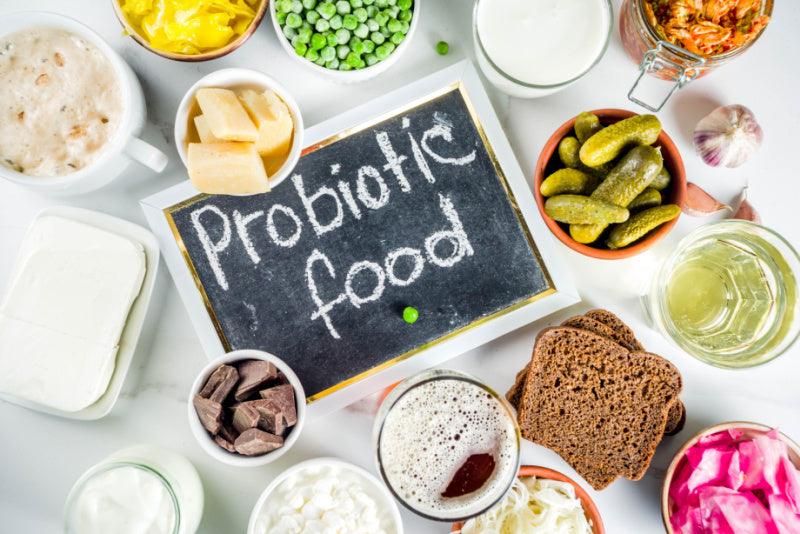
The Power of Probiotics
Share
Probiotics are small but mighty, offering a plethora of health benefits that can transform your well-being. In this post, we'll explore the world of probiotics, delving into various types, how to incorporate them into your daily routine, the remarkable effects they have on your health, and the potential consequences of neglecting them.
Understanding Probiotics: Nature's Friendly Bacteria
Probiotics are live microorganisms that provide numerous health benefits when consumed in adequate amounts. These beneficial bacteria can be found in various foods, supplements, and even some skincare products. Let's dive deeper into the different types of probiotics:
Types of Probiotics: The Beneficial Bacterial Diversity
Probiotics come in various strains, each with its unique advantages. Some of the most common probiotic strains include:
- Lactobacillus: These probiotics are found in yogurt and fermented foods, promoting gut health and aiding digestion.
- Bifidobacterium: Known for their presence in the colon, Bifidobacterium strains help in breaking down complex carbohydrates and preventing harmful bacteria from thriving.
- Saccharomyces boulardii: This probiotic yeast strain can help combat diarrhea, particularly associated with antibiotic use.
- Streptococcus thermophilus: Often used in yogurt fermentation, this strain supports digestion and can assist in lactose tolerance.
- Lactic acid bacteria: Various strains of lactic acid bacteria are utilized in cheese and other fermented dairy products, providing benefits for gut health.
How to Take Probiotics: Incorporating Them Into Your Daily Routine

Taking probiotics is relatively straightforward, and there are various ways to include them in your daily regimen:
- Dietary Sources: Consume probiotic-rich foods like yogurt, kefir, sauerkraut, kimchi, miso, and kombucha. These items are both delicious and beneficial.
- Probiotic Supplements: If you find it challenging to consume probiotics through food, consider probiotic supplements in capsule, tablet, or powder form. Make sure to choose a reputable brand with strains suitable for your specific needs.
- Probiotic Skincare: Some skincare products incorporate probiotics, aiming to maintain a balanced skin microbiome and address issues like acne and inflammation.
The Health Benefits of Daily Probiotics
Now, let's explore the impressive range of health benefits that daily probiotics offer:
Improved Digestive Health
- Balanced Gut Microbiome: Probiotics foster a harmonious environment in your gut, promoting the growth of beneficial bacteria and inhibiting harmful ones.
- Relief from Digestive Disorders: Probiotics can help alleviate symptoms of irritable bowel syndrome (IBS), diarrhea, and constipation.
-
Better Nutrient Absorption: A balanced gut microbiome aids in the absorption of essential nutrients, improving overall health.

Enhanced Immune System
- Boosted Immune Response: Probiotics play a crucial role in stimulating immune cells, helping your body fight infections and illnesses.
- Reduced Risk of Allergies: Probiotics may help reduce the risk of allergic reactions by modulating the immune system's response.
Mental and Emotional Well-being
- Gut-Brain Connection: Emerging research suggests that a balanced gut microbiome can positively affect mental health, potentially reducing anxiety and depression.
- Stress Reduction: Some probiotics may help mitigate the impact of stress on the body.
Skin Health
- Clearer Complexion: Probiotic skincare products can help maintain a balanced skin microbiome, reducing acne breakouts and inflammation.
- Protection from Environmental Stressors: Skin probiotics can act as a shield against environmental toxins and UV damage.
Consequences of Neglecting Probiotics: The Downsides of Imbalance
What happens when you neglect your gut health and forego the daily dose of probiotics? Here are some potential negative consequences: 
- Digestive Discomfort: An unbalanced gut microbiome can lead to frequent bloating, gas, and irregular bowel movements.
- Weakened Immune System: Without the support of probiotics, your immune system may not function optimally, making you more susceptible to infections.
- Mental and Emotional Issues: Neglecting your gut health could contribute to mental health concerns, such as anxiety and depression.
- Skin Troubles: An imbalanced skin microbiome may result in acne, eczema, and other skin conditions.
- Nutrient Deficiencies: Poor gut health can hinder nutrient absorption, leading to deficiencies and potential long-term health issues.
Choosing the Right Probiotic for Your Needs
Selecting the most suitable probiotic for your specific health needs is crucial. Here's how to make an informed choice:
- Consult a Healthcare Professional: Seek guidance from a healthcare provider or nutritionist to determine the most beneficial probiotic strains for your condition.
- Read Labels Carefully: When opting for probiotic supplements, examine the label for information on strain, potency, and recommended usage.
- Consider Prebiotics: Prebiotics are non-digestible fibers that nourish probiotics. A combination of pre- and probiotics can enhance their effectiveness.
Caution and Potential Side Effects
While probiotics are generally safe for most people, there is one thing to keep in mind, if you're taking medications, especially immunosuppressants or antibiotics, consult your healthcare provider before starting probiotics.
The Wellness Revolution in a Tiny Capsule
Probiotics are not just another health trend; they're a wellness revolution packed into a tiny capsule. By embracing the right strains of these beneficial bacteria, you can transform your digestive health, strengthen your immune system, and even enhance your mental and emotional well-being. Don't neglect the vital role of probiotics in your life; make them a daily part of your health routine and experience the remarkable benefits they offer.

